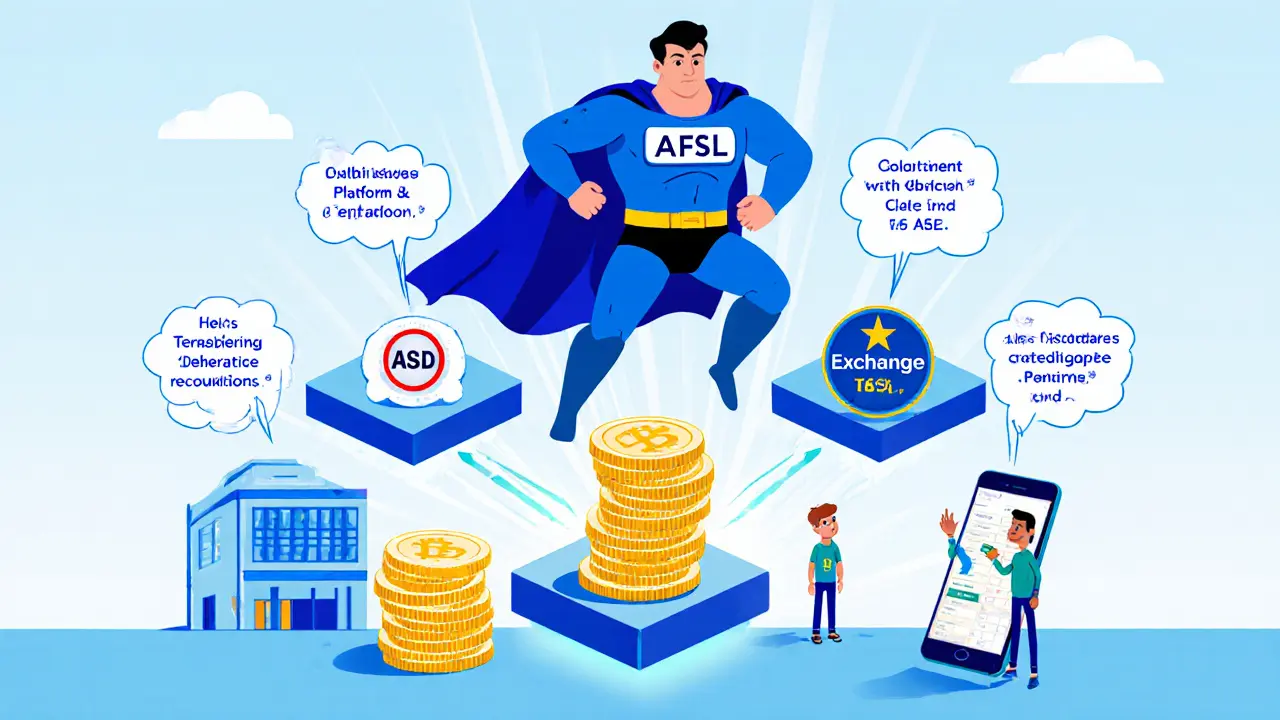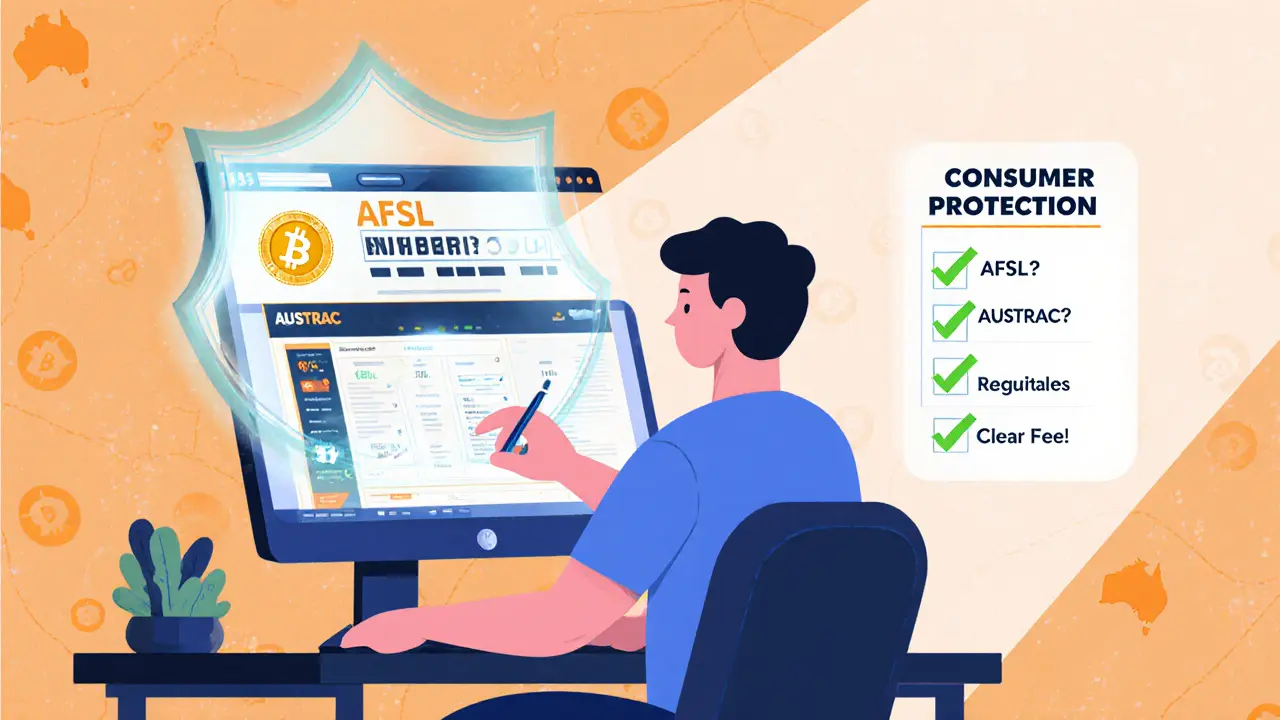Crypto Platform Compliance Checker
Check if a crypto platform meets Australian consumer protection standards
Enter the details of a crypto platform to see if it complies with the new 2025 regulations.
Compliance Result
About the New Regulations
The Treasury Laws Amendment Bill 2025 introduces a unified regulatory framework for crypto platforms in Australia. Key requirements include:
- All crypto platforms must hold an Australian Financial Services Licence (AFSL)
- Platforms must implement transparent disclosure, risk management, and dispute resolution protocols
- Exemptions apply for low-risk platforms with volumes under AUD 10 million annually and individual customer limits under AUD 5,000
When it comes to buying Bitcoin or NFTs, Australians have long faced a legal maze. Consumer protection for cryptocurrency in Australia is a rapidly evolving framework that aims to bring clarity, safety, and enforceable rights to everyday investors. The push for crypto consumer protection has intensified after high‑profile collapses and a growing appetite for digital assets.
Why the old system felt like a patchwork
Before the 2025 reforms, three main pillars tried to keep crypto users safe:
- Australian Transaction Reports and Analysis Centre (AUSTRAC) enforced anti‑money‑laundering and counter‑terrorism financing rules. Every exchange had to register, keep transaction logs, and file suspicious activity reports.
- Australian Securities and Investments Commission (ASIC) stepped in only when a crypto‑asset was classed as a financial product. In those cases, issuers and intermediaries needed an Australian Financial Services Licence (AFSL).
- The Australian Consumer Law provided a blanket prohibition on misleading or deceptive conduct, even for assets that fell outside traditional financial regulations.
While each agency offered valuable protections, the overlap created uncertainty. A platform could be AFSL‑licensed for one token but face AUSTRAC scrutiny for another, leaving consumers unsure which rules applied.
What the Treasury Laws Amendment Bill 2025 changes
The Albanese Government’s draft legislation, officially titled the Treasury Laws Amendment Bill 2025: Digital Asset, and Tokenised Custody, Platforms, consolidates crypto regulation under the Corporations Act 2001. Its headline features are:
- Two new product categories - Digital Asset Platforms (DAP) and Tokenised Custody Platforms (TCP). Both fall under the umbrella term “crypto platforms.”
- All crypto platforms must hold an Australian Financial Services Licence (AFSL). This subjects them to existing conduct, disclosure, and competence obligations.
- Penalties start at AUD16.5million for serious breaches, creating a strong financial deterrent.
- Exemptions for “low‑risk” platforms: those handling less than AUD5,000 per customer and under AUD10million in annual transaction volume can operate without a full licence.
The bill covers commodity‑like assets (Bitcoin), collectible assets (most NFTs), stablecoins, and tokenised securities, but it deliberately leaves gaming‑related NFTs out of scope.

How consumer rights are reinforced
Once a crypto platform is AFSL‑licensed, it must adhere to a suite of consumer‑focused obligations:
- Transparent disclosure: Fees, risks, and custody arrangements must be presented in plain language before a transaction is completed.
- Conflict‑of‑interest management: Platforms can’t favour one token over another unless customers are clearly informed.
- Risk‑management protocols: Adequate cybersecurity, insurance, and asset segregation policies are mandatory.
- Dispute resolution: An internal complaints process plus access to the Australian Financial Complaints Authority (AFCA) must be offered.
- Compensation schemes: In the event of platform failure, licensed operators must maintain a financial safety net to reimburse eligible customers.
These measures echo the protections already enjoyed by traditional finance customers, which should boost confidence in crypto investments.
What crypto businesses need to do now
For an exchange or wallet service, compliance will look like this:
- Apply for an AFSL through ASIC, providing evidence of governance, financial stability, and qualified management.
- Implement a robust Anti‑Money Laundering and Counter‑Terrorism Financing (AML/CTF) program. This includes real‑time transaction monitoring, Know Your Customer (KYC) checks, and regular reporting to AUSTRAC.
- Document every transaction for at least seven years and submit annual compliance statements to the regulator.
- Publish clear, non‑misleading marketing material that meets both ASIC’s financial‑product rules and the broader Australian Consumer Law.
- Set up an internal dispute‑resolution team and register with the AFCA to handle consumer complaints.
While the licensing cost and ongoing reporting add overhead, most major Australian exchanges - Independent Reserve, BTC Markets, and OKX Australia - have signaled support, noting that legitimacy outweighs the expense.
Quick checklist for consumers
Before you click “Buy” on any crypto platform, run through this short list:
- Does the service display an AFSL number on its website?
- Can you find a clear fee schedule and risk disclaimer?
- Is the platform registered with AUSTRAC for AML/CTF compliance?
- Does the site offer an easy way to lodge a complaint with AFCA?
- Are KYC procedures transparent, and do they explain why your data is needed?
If the answer to any question is “no,” treat the platform as high risk.

Comparison: Existing agencies vs. the new crypto‑platform regime
| Aspect | AUSTRAC (AML/CTF) | ASIC (Financial‑product oversight) | New Crypto Platforms (DAP/TCP) |
|---|---|---|---|
| Primary focus | Prevent money‑laundering, terrorism financing | Protect investors in financial products | Full consumer‑protection & conduct standards |
| Licensing requirement | Registration only | AFSL required for financial products | AFSL mandatory for all DAP/TCP (except low‑risk exemption) |
| Enforcement penalties | Up to AUD7million per breach | Up to AUD10million or higher | Starting at AUD16.5million for serious breaches |
| Consumer dispute pathway | Limited - mainly reporting to AUSTRAC | ASIC can direct to AFCA | Mandatory internal complaints process + AFCA access |
| Scope of assets | All crypto exchanges (AML/CTF) | Only assets classified as financial products | All digital assets traded on licensed platforms, including stablecoins and tokenised securities |
What the future could hold
The draft legislation is still in public consultation until late October 2025, but its direction is clear: Australia wants a “legitimated good actors, shut out the bad” crypto market. If the framework lands as intended, we can expect:
- More overseas exchanges seeking an Australian licence to access the market.
- Greater investor confidence leading to higher retail participation in tokenised securities and stablecoins.
- Improved enforcement actions against fraudsters, thanks to clearer jurisdiction and heavier penalties.
- Potential ripple effects in neighbouring jurisdictions that look to Australia’s model for guidance.
For now, the safest route for Australians is to stick with platforms that already hold an AFSL and demonstrate compliance with AUSTRAC’s AML/CTF rules.
Frequently Asked Questions
Do I need to check if a crypto exchange has an AFSL?
Yes. An AFSL number proves the platform is subject to the same conduct and disclosure rules that protect traditional finance customers. Without it, the exchange is operating outside the new consumer‑protection regime.
What happens if a licensed crypto platform goes bust?
Licensed platforms must maintain a compensation fund or insurance cover. In a failure scenario, eligible customers can claim restitution through that fund, and the Australian Financial Complaints Authority can oversee the process.
Are NFTs used in video games covered by the new rules?
No. The bill specifically excludes gaming‑related NFTs, treating them as non‑financial digital items. However, any marketplace that also trades financial‑product NFTs would still need an AFSL.
Can a small crypto wallet provider avoid the licensing requirement?
If the provider’s total annual transaction volume stays below AUD10million and no single customer holds more than AUD5,000, it qualifies for the low‑risk exemption and does not need a full AFSL.
How does AUSTRAC’s role change after the bill passes?
AUSTRAC will continue to enforce AML/CTF obligations, but the heavy‑lifting of consumer‑protection conduct will shift to ASIC’s AFSL framework. The two regulators will work together on joint supervision of licensed platforms.


Nicholas Kulick
The new AFSL requirement will push many small exchanges to register or face penalties.